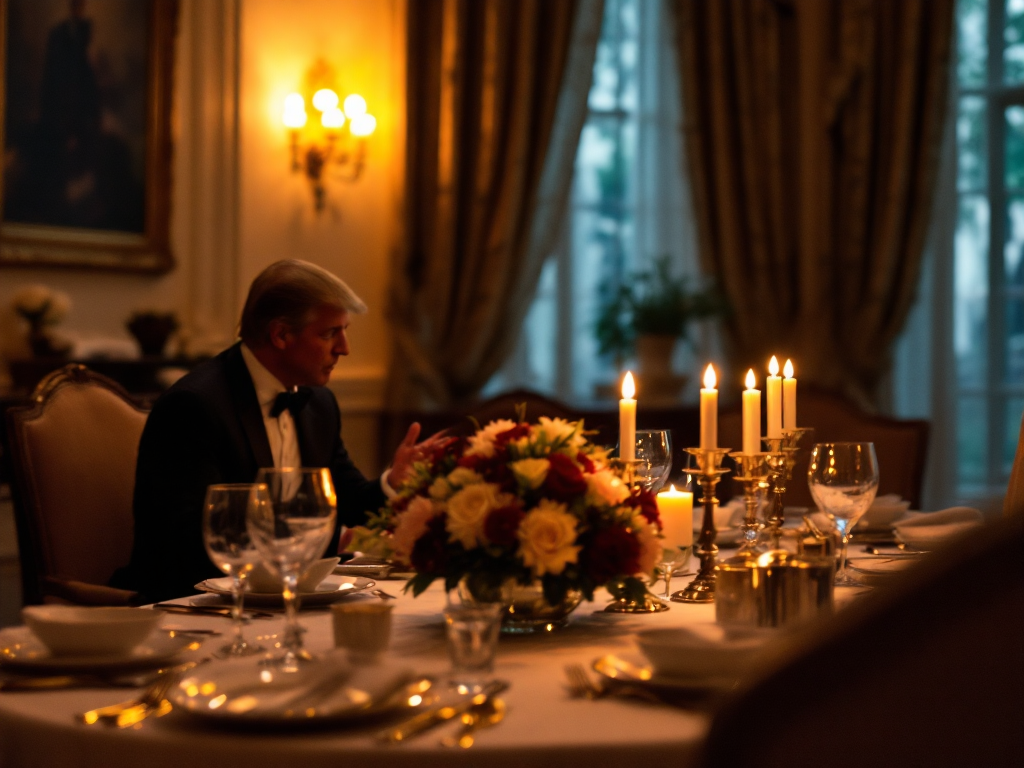An Unexpected Meeting at the White House
Television host and comedian Bill Maher, traditionally a vocal critic of former President Donald Trump, recently visited the White House for a dinner, describing the interaction as surprisingly positive. Maher openly reflected on his experience during a recent episode of his HBO show, “Real Time with Bill Maher,” stating he found Trump to be notably more courteous and genuine than portrayed publicly. The dinner, arranged by musician Kid Rock, was marked by an atmosphere of mutual respect despite Maher’s long-standing criticisms of Trump’s policies and character.
Maher emphasized one surprising aspect of the evening, noting, “To the president’s credit, there was no pressure to align with MAGA ideologies.” This was significant given Maher’s historical stance as a staunch opponent of Trump’s political views, often discussing his administration critically on his television program.
An interesting anecdote Maher shared from the dinner was his presentation to Trump of a documented list of nearly 60 insults Trump had directed at him previously. Trump reportedly took the gesture humorously, willingly autographing the list for Maher. This action marked a departure from Trump’s often combative public exchanges, revealing a different, lighter side of his character.
“It was refreshing and somewhat disarming to see him engage with humor over past disagreements,” Maher said during the episode, highlighting Trump’s unexpectedly congenial attitude.
Graciousness and Surprising Admissions
Throughout their conversation, Maher recounted addressing contentious issues directly, including the Syrian refugee crisis, Iran, the ongoing conflict in Gaza, and notably, Trump’s controversial statements regarding a possible third term. Despite addressing such heavy topics, Maher described a comfortable conversational dynamic, stating specifically, “I never felt I had to walk on eggshells around him.”
Perhaps most significant was Trump’s candid discussion about the 2020 presidential election, an event that has historically been a source of contention and misinformation. Maher expressed astonishment when Trump openly acknowledged his electoral defeat, directly saying, “He used the word ‘lost,’ and I distinctly remember saying, ‘Wow, I never thought I’d hear you say that.’” Such a concession has remained rare in Trump’s public engagements, making this interaction notable.
Adding personal perspective to the conversation, Maher maintained a reflective stance rather than an outright alignment or endorsement of Trump or his political stance. Maher reiterated his position as a skeptic of Trump’s broader political strategies and impact on American policy.
“Why he isn’t that way in other settings, I don’t know, and I can’t answer, and it’s not my place to answer,” Maher candidly remarked, leaving open the question of Trump’s contrasting public and private personas.
Contextualizing the Encounter and Its Implications
Bill Maher’s recent encounter with Trump at the White House brings attention to the broader topic of perceived versus actual persona among political leaders. Historically, public figures have often cultivated specific images for strategic purposes, shaping public perception and communication while in office. Trump’s presidency was particularly characterized by highly polarized public rhetoric, often causing division and controversy both domestically and internationally.
During the administration from 2017 to 2021, Trump faced intense scrutiny and criticism from the media and public figures like Maher, often accused of polarizing tactics. Maher himself was prominently vocal, hosting numerous discussions dissecting Trump’s rhetoric and policy approaches critically. His recent account, therefore, provides an unusual insight into the nuanced contrast between Trump’s intensely scrutinized public presence and a seemingly more genial private demeanor.
Further contextualizing this episode, political analysts suggest that such interactions could be strategic efforts for image-softening or indicative of genuine interpersonal flexibility not usually observable through public channels. Dr. Laura Jenkins, a professor of political psychology at Georgetown University, remarked in a recent commentary: “Leaders, especially those as publicly polarizing as Trump, often display markedly different personalities in private interactions. These glimpses can add depth to our understanding of their leadership style and personal motivations.”
This meeting also reignites discussions around how candid engagements between opposing viewpoints might influence public dialogue. Given the increasing polarization seen in American politics, encounters like Maher and Trump’s dinner could suggest potential pathways for more constructive discourse across ideological divides.
Maher’s account doesn’t signal any fundamental ideological shift or endorsement of Trump’s policies, but it offers compelling insight into the complexities underlying political personalities, further illustrating the potentially vast gap between public perceptions and personal realities of leaders. As Maher himself summarized, the evening was neither politically transformative nor indicative of any endorsement; rather, it was an experience in dialogue and mutual understanding, providing Americans a rare glimpse behind the curtain of political theater.


